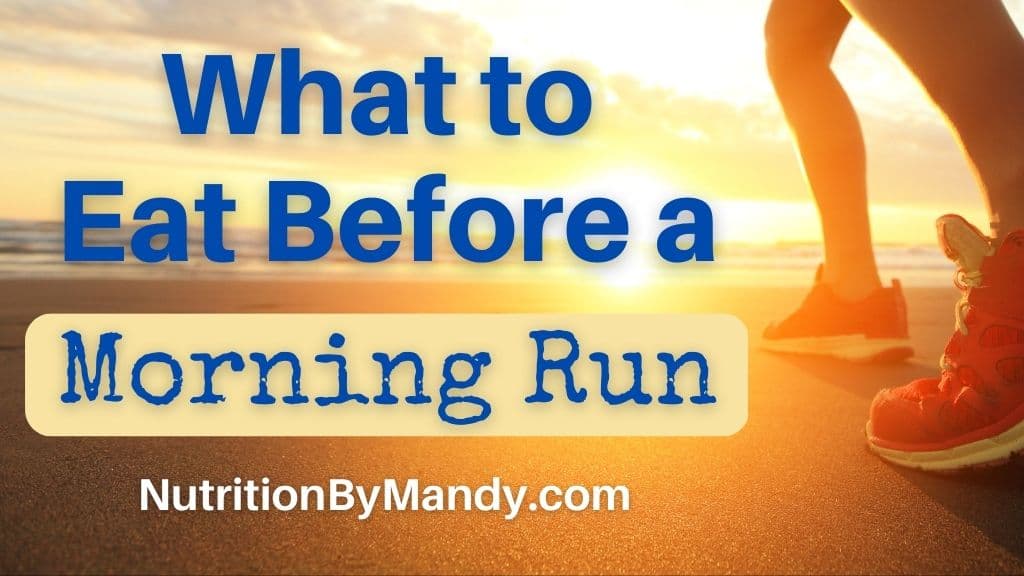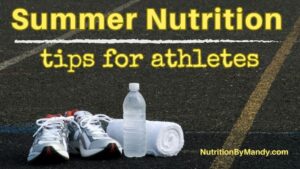Last Updated on October 29, 2024 by Mandy Tyler, M.Ed., RD, CSSD, LD
What to Eat Before a Morning Run
It can be helpful for athletes to know what to eat before a morning run to fuel their workout.
Let’s take a look at some key factors to consider when planning your morning meal or snacks. Then we will identify what athletes can eat before a morning run to help them train at their best.
Key Factors Determining What to Eat Before a Morning Run
When determining what to eat before a morning run, there are several factors that should be considered.
Key factors that can help athletes determine what to eat prior to running include:
- Time until the morning run
- Run length and intensity
- Individual preferences
- Goals of the training session
- Personal goals
Time Until the Morning Run
First, athletes need to take into account how long they have until they will start their morning run.
If they have several hours, a meal may be desirable. However, if they will be starting the run within the next hour, a carbohydrate-rich snack may be more appropriate.
Morning Run Length and Intensity
Second, athletes should consider how long the run will be and at what intensity.
Athletes who will be running for a longer distance and/or at a higher intensity will have increased energy demands for the session.
Individual Preferences
Third, each athlete is unique with regards to food likes and dislikes. In addition, athletes differ in regard to the foods they tolerate best prior to running. Some athletes prefer solid foods, while others may prefer liquids before a run.
Energy needs can be met in a variety of ways, so determining the foods/beverages that work best for the athlete is important.
Goals of the Training Session
Fourth, it is important to consider what the goal or desired outcome of the morning run is. Athletes desiring to get in a high-quality run to prepare for an upcoming race will want to focus on fueling their run with carbohydrates.
Conversely, some athletes may desire to train in a fasted state or with low carbohydrate availability to provoke a desired training response. Thus, knowing the desired goal of the training session is important when determining the best meal or snack to eat before a morning run (1).
For the purposes of this blog, we will be looking at what to eat before a morning run to promote a high-quality training session.
Personal Goals
Finally, the athlete’s personal goals can influence what to eat before a morning run. For example, if the athlete is training for a race or running to improve fitness levels how they fuel may differ from those who are running with the primary purpose of weight loss.
Similar to above, this blog is focused on how individuals should fuel to support high-quality training and performance goals.

Carbohydrates: Energy for Your Morning Run
Carbohydrates provide the body with the energy needed to perform at its best. Athletes can get carbohydrates in the diet from a variety of sources, including:
- Grains: Pasta, rice, bread, bagels, oatmeal, cereal
- Fruit: Fresh, frozen, dried, canned in natural juices, applesauce
- Starchy vegetables
- Dairy: Milk and yogurt
Similar to gas for a car, carbohydrates provide the fuel for the body to run on. Consuming carbohydrates with breakfast prior to a morning run can help refill energy (glycogen) stores in the body (2).
Thus, athletes desiring to complete a high-quality run in the morning will want to ensure carbohydrates are at the foundation of their morning meal and snacks.
Athletes following a gluten-free diet can easily meet their carbohydrate needs through gluten-free grains, fruit, starchy vegetables, and dairy.
If you are looking for gluten-free ideas for before a workout, take time to read my blog: Gluten-Free Pre-Workout Meals and Snacks for Athletes.
Including Lean Protein with Pre-Run Meal
In addition to carbohydrates, athletes can include a moderate amount of lean protein with their meal several hours before a morning run.
Potential protein sources to enjoy with the morning meal include:
- Eggs
- Turkey sausage
- Chicken, turkey, ham
- Greek yogurt
- Cottage cheese, low-fat cheese
- High-protein milk
- Tofu
- Nuts and nut butters
For additional plant-based options, check out my blog: How to Build an Ideal Vegan Pre-Workout Meal.
What to Eat Before a Morning Run: Meal vs. Snack
In general, the amount and type of foods that athletes should eat before a morning run depends on how much time they have prior to the start of the activity.
When athletes have less time prior to the run, the size of the pre-event meal should decrease and the focus should be on consuming carbohydrates for energy.
Putting this all together, let’s look at ideas for meals and snacks athletes can enjoy before a morning run.
Breakfast Before a Morning Run
When athletes have 3-4 hours before a morning run, they can plan to eat a healthy breakfast that will provide the energy needed for the upcoming activity
The breakfast should include a good source of carbohydrates, a moderate amount of lean protein, and be relatively low in fat and fiber.
Example meals for before a morning run may include:
- Overnight oats, fresh sliced fruit
- Pancakes with fresh strawberries and scrambled eggs
- Bagel with nut butter, cottage cheese with pineapple
- Fruit smoothie, low-fat muffins
- Toaster waffles with nut butter, hard boiled eggs, fresh sliced melon
- English muffin with egg and ham, yogurt parfait with berries and granola
Quick Snacks Before a Morning Run
When athletes have less time before a morning run, they should focus on eating easy to digest high-carb snacks or liquids.

In the hour or two before a run, consider enjoying the following quick snacks:
- Small piece of fresh fruit
- Applesauce squeeze, dried fruit, fruit leather
- Bagel, English muffin, toast with jelly
- Fig bar, low-fat granola bar, cereal bar
- Toaster waffle, low-fat muffin
- Cream of wheat, instant oatmeal, grits
- Dry breakfast cereal, graham crackers, animal crackers
What Foods Not to Eat Before a Morning Run
Although athletes vary in foods they feel comfortable eating before a run, there are some foods that are more likely to cause GI distress during activity.
In general, athletes should limit foods that are high in fat, fiber, and/or protein too close to the start of a run (1).
In the morning before a run, this includes foods such as:
- High-fat or greasy breakfast meats such as bacon, pork sausage, and chorizo.
- Fried foods such as fried potatoes or donuts
- Heavy cream, cheese, or greasy sauces such as gravy
- High-fiber breads or cereals
- Beans and high-fiber vegetables (broccoli, cabbage)

Hydration for Your Morning Run
When you are planning what to eat before a run, don’t forget about the importance of hydration.
Dehydration can negatively impact performance and increase your risk of heat illness. Therefore, starting your run in an optimally hydrated state is important.
Although hydration needs vary amongst individuals, there are some general guidelines athletes can follow before a run.
It is recommended that athletes drink 5-7 mL of fluid per kg of body weight approximately 4 hours prior to an event (3). For a 160-pound athlete, this calculates to be ~12 – 17 fluid ounces. Thus, in general, consuming approximately 2 cups of fluid with your breakfast before a run can assist you with meeting this goal.
In the hour leading up to the run, athletes should continue hydrating, aiming to drink another 4-8 oz of fluid during this time period.
Practice What You Eat Before a Morning Run
Since athletes vary on foods they tolerate prior to activity, it is important to take time to figure out what foods work best for each athlete. Athletes should practice what they eat before a morning run prior to race day.
Practicing the pre-race meals and snacks helps athletes learn their individual tolerances and what foods they run best on. It will also give athletes confidence on race day that they are fueled to perform at their best.

What to Eat Before a Morning Run
You are now set with a variety of ideas for what to eat before a morning run. Have fun trying out different meal and snack combinations to find the foods that work best for you.
For additional sports nutrition tips for runners, check out my blog: Post Run Breakfast Ideas for Athletes.
Join the Nutrition By Mandy Email List & Get a Free Athlete’s Grocery List
Click HERE to join the Nutrition By Mandy e-mail list. When you join you will receive a free athlete’s grocery list to print and take with you to the store.
About the Author
Mandy Tyler is a Sports Dietitian Nutritionist in the San Antonio, TX area. She is a Registered and Licensed Dietitian, a Board-Certified Specialist in Sports Dietetics, a Licensed Athletic Trainer, and is a Certified Exercise Physiologist through the American College of Sports Medicine. Mandy has experience working with athletes at the high school, collegiate, and professional levels. She believes the key to reaching one’s full potential, both in everyday life and in sports performance, relies on a healthy nutritional foundation.

If you are looking to take your performance to the next level, make sure to check out my new Sports Nutrition Game Day Guide. This downloadable guide is written to help athletes develop an individualized plan to achieve peak performance on game day






